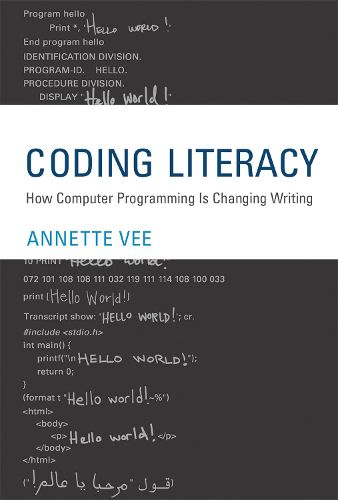Readings Newsletter
Become a Readings Member to make your shopping experience even easier.
Sign in or sign up for free!
You’re not far away from qualifying for FREE standard shipping within Australia
You’ve qualified for FREE standard shipping within Australia
The cart is loading…






How the theoretical tools of literacy help us understand programming in its historical, social and conceptual contexts.The message from educators, the tech community, and even politicians is clear- everyone should learn to code. To emphasize the universality and importance of computer programming, promoters of coding for everyone often invoke the concept of literacy, drawing parallels between reading and writing code and reading and writing text. In this book, Annette Vee examines the coding-as-literacy analogy and argues that it can be an apt rhetorical frame. The theoretical tools of literacy help us understand programming beyond a technical level, and in its historical, social, and conceptual contexts. Viewing programming from the perspective of literacy and literacy from the perspective of programming, she argues, shifts our understandings of both. Computer programming becomes part of an array of communication skills important in everyday life, and literacy, augmented by programming, becomes more capacious. Vee examines the ways that programming is linked with literacy in coding literacy campaigns, considering the ideologies that accompany this coupling, and she looks at how both writing and programming encode and distribute information. She explores historical parallels between writing and programming, using the evolution of mass textual literacy to shed light on the trajectory of code from military and government infrastructure to large-scale businesses to personal use. Writing and coding were institutionalized, domesticated, and then established as a basis for literacy. Just as societies demonstrated a literate mentality regardless of the literate status of individuals, Vee argues, a computational mentality is now emerging even though coding is still a specialized skill.
$9.00 standard shipping within Australia
FREE standard shipping within Australia for orders over $100.00
Express & International shipping calculated at checkout
How the theoretical tools of literacy help us understand programming in its historical, social and conceptual contexts.The message from educators, the tech community, and even politicians is clear- everyone should learn to code. To emphasize the universality and importance of computer programming, promoters of coding for everyone often invoke the concept of literacy, drawing parallels between reading and writing code and reading and writing text. In this book, Annette Vee examines the coding-as-literacy analogy and argues that it can be an apt rhetorical frame. The theoretical tools of literacy help us understand programming beyond a technical level, and in its historical, social, and conceptual contexts. Viewing programming from the perspective of literacy and literacy from the perspective of programming, she argues, shifts our understandings of both. Computer programming becomes part of an array of communication skills important in everyday life, and literacy, augmented by programming, becomes more capacious. Vee examines the ways that programming is linked with literacy in coding literacy campaigns, considering the ideologies that accompany this coupling, and she looks at how both writing and programming encode and distribute information. She explores historical parallels between writing and programming, using the evolution of mass textual literacy to shed light on the trajectory of code from military and government infrastructure to large-scale businesses to personal use. Writing and coding were institutionalized, domesticated, and then established as a basis for literacy. Just as societies demonstrated a literate mentality regardless of the literate status of individuals, Vee argues, a computational mentality is now emerging even though coding is still a specialized skill.